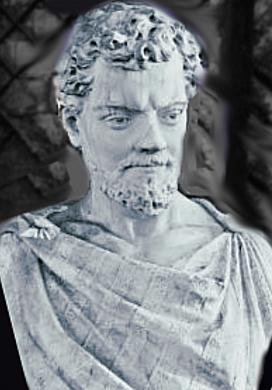Fear was the first thing on earth to make gods.

"Titus Lucretius Carus" was a Roman Republic/Roman poet and philosopher. His only known work is the epic philosophical poem De rerum natura about the tenets and philosophy of Epicureanism, and which is usually translated into English as On the Nature of Things.
Very little is known about Lucretius's life; the only certain fact is that he was either a friend or Patronage in ancient Rome/client of Gaius Memmius (poet)/Gaius Memmius, to whom the poem was addressed and dedicated.
The De rerum natura was a considerable influence on the Augustan poets, particularly Virgil (in his Aeneid and Georgics, and to a lesser extent on the Satires and Eclogues) and Horace. The work virtually disappeared during the Middle Ages but was rediscovered in 1417 in a monastery in Germany by Poggio Bracciolini, and it played an important role both in the development of atomism (Lucretius was an important influence on Pierre Gassendi
) and the efforts of various figures of the Enlightenment era to construct a new Christian humanism. The book The Swerve: How the World Became Modern (2011) by Stephen Greenblatt is a narrative of the discovery of the old Lucretius manuscript by Poggio.
If you enjoy these quotes, be sure to check out other famous poets! More Lucretius on Wikipedia.It is great wealth to a soul to live frugally with a contented mind.
If men saw that a term was set to their troubles, they would find strength in some way to withstand the hocus-pocus and intimidations of the prophets.
From the heart of the fountain of delight rises a jet of bitterness that tortures us among the very flowers.
Such evil deeds could religion prompt.
Love is a product of habit.
What is food to one, is to others bitter poison.
The drops of rain make a hole in the stone, not by violence, but by often falling.
Even if I knew nothing of the atoms, I would venture to assert on the evidence of the celestial phenomena themselves, supported by many other arguments, that the universe was certainly not created for us by divine power: it is so full of imperfectio.
So potent was religion in persuading to evil deeds.
How many evils have flowed from religion.
The falling drops at last will wear the stone.
Nothing can be created from nothing.
Copyright © 2024 Electric Goat Media. All Rights Reserved.